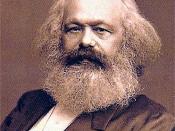There were only 11 people huddled together in Highgate Cemetery for the burial of Karl Marx in March, 1883. At the end of a short speech his friend and collaborator Frederick Engels described Marx as 'the best hated and most calumniated man of his times.' That hate and calumny had a specially persistent quality.
For most rebels, socialists and even revolutionaries, death brings relief from high-born abuse. Hated though they were by top people in their lifetime, after their death men like Aneurin Bevan, Keir Hardie and even James Connolly were treated with sympathy and even appreciation. Detestation of Karl Marx, however, has persisted for over a hundred years. Again and again his works are denounced as poisonous, irrelevant or obscure. In a passage quoted by Francis Wheen the former Labour prime minister, Harold Wilson, who had spent much of his youth poring over dull footnotes about the British railway system, remarked that he had only got as far as page two of Marx's Capital.
'I felt that two sentences of main text and a page of footnotes was too much,' he explained.
I am reviewing a book by a friend and colleague, and should beware of hyperbole and puff, so I can only say that this is a marvellous book which combines years of voracious reading with the stylish writing and polemical wit which Francis Wheen regularly showers on readers of the Guardian. His object, triumphantly achieved, is to rescue Marx from those interminable haters and calumniators. One by one he despatches the myths. Was Marx bound by dogma, who repeated by rote what had mysteriously become known as Marxism? Wheen wishes such critics, who include Tony Blair, would read the Economic and Philosophical Manuscripts which Marx wrote when he was 26 in 1844 and which 'reveal the...


